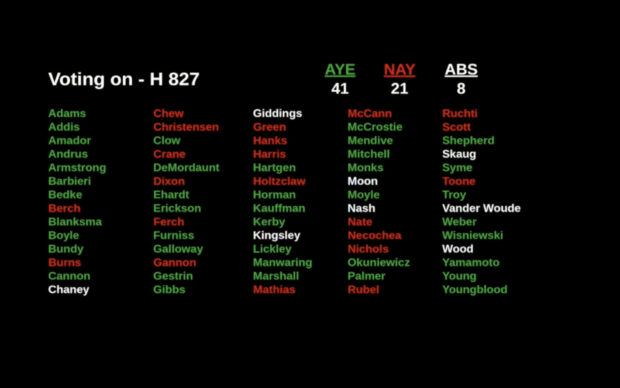
The 2022 legislative session appeared to be nearing its conclusion Friday evening, as lawmakers finally passed an Idaho Commission on Libraries budget.
The House passed the fifth version of the libraries budget shortly after 10 p.m. Friday — barely three hours after the House killed a nearly identical budget. The Senate followed suit minutes later.
Tied to concerns over obscene materials — and whether K-12 students can access such materials through public libraries — the commission budget is one of the last pieces of unfinished business for the 2022 Legislature.
Friday marked the 75th, but not final, day of the session. Shortly before midnight, both houses voted to recess until Thursday — after the House voted down a motion to adjourn for the year. The decision to recess keeps open the option for the Legislature to try to override any gubernatorial vetoes in the next few days.
The libraries budget now goes to Gov. Brad Little’s desk. And the budget was a must-pass item. Before the Legislature can adjourn for the year, lawmakers are required to set budgets for all state agencies, including the library commission.
A downsized budget …
Ultimately, the budget was reworked — and slashed — by a shade over $3.5 million.
After the House had narrowly voted down a libraries budget Thursday afternoon, the Joint Finance-Appropriations Committee focused Friday morning on cutting federal funding that the libraries could use for technology projects. Little had requested the technology line item.
That brought the commission’s bottom line to roughly $7.7 million, including nearly $4.5 million from the state’s general fund, from sales and income taxes.
The cut was evidently designed to bring around House conservatives who had voted against Thursday’s version of the budget.
It didn’t work, at least not right away.
Early Friday evening, the House voted down a libraries commission budget on a 29-36 vote — a slightly wider vote margin than Thursday’s 33-36 vote.
That sent House Republicans into caucus. And it sent JFAC back to the drawing board.
Meeting at 8:30 p.m. — far from their customary hour of 8 a.m. — the budget committee quickly wrote another libraries budget. This one reduced the bottom line by a mere $100, reducing a budget item for digital training.
Democrats made an unsuccessful motion to restore $1.75 million from the $3.5 million technology budget. It failed on a party-line vote.
JFAC then approved another $7.7 million budget, with the $100 deletion, and that’s the version the House passed Friday night.
… and a daylong debate
The debate over the library budget cuts began early, with JFAC’s first meeting Friday morning.
Sen. Janie Ward-Engelking noted that libraries are often a key source of broadband, especially in rural communities — a service that has taken on added importance during the pandemic. “This budget does not reward the historic effort that libraries have done the past few years,” said Ward-Engelking, D-Boise.
Rep. Ron Nate, R-Rexburg, said the downsized budget was still “excessive,” and unlikely to overcome resistance in the House. He proposed nearly $1.5 million in additional cuts, but no committee member seconded his motion.
The committee then supported the budget — including the $3.5 million cut in technology projects. But it passed on a narrow 12-7 vote, over bipartisan opposition.
This bill met with bipartisan opposition on the House floor, when it finally came up for a vote at about 6:30 p.m.
Debate was brief. Only one House member actually spoke up: Rep. Greg Chaney, R-Caldwell. He dismissed the notion that the $3.5 million change in the budget constituted a cut, calling it political retribution.
“I consider it to be a fine,” said Chaney.
The bill’s floor sponsor, Rep. Colin Nash, D-Boise, made at best a halfhearted pitch for the bill. “Take it or leave it,” Nash said in his closing debate.
Ultimately, some of the House hardline conservatives voted against the budget, as did all 12 of the House’s Democrats.
The House debate resumes — and turns testy
When the House got another shot at a library budget Friday evening, the debate quickly became strident.
There was no mention of the lone change in the bill, the $100 reduction. Instead, House Democrats sharply criticized their Republican colleagues of political payback — because librarians had spoken out against House Bill 666, a House-passed bill that would have left librarians and school employees subject to prosecution for disseminating obscene materials.
“It’s downright un-American,” said Rep. Ned Burns, D-Bellevue.
“This issue goes so far beyond libraries,” said House Minority Leader Ilana Rubel, D-Boise. “It is profoundly dangerous.”
Several Republicans objected, saying Democrats were mischaracterizing their position.
Ultimately, the vote wasn’t close. The House passed the late-evening version of the budget on a 41-21 vote.

The Senate debate was much shorter — with only Ward-Engelking rising to criticize the cuts in the budget. It passed, 23-5.
‘A public health crisis:’ House obscenity resolution passes
While the library budget remained up in the air Friday, the House quickly passed a resolution calling for a working group on obscenity.
The “House Working Group for Protecting Idaho Children from Material Harmful to Minors in Libraries” would include lawmakers of both parties, an Idaho Library Association member and the state librarian.
“The Idaho Legislature has determined that the proliferation of pornographic materials is a public health crisis,” the resolution says, in part. “Idaho parents should reasonably expect that their children will not encounter material harmful to minors while making use of the culturally enriching materials, services and programs provided by public school and community libraries.”
Without discussion, the House Ways and Means Committee sent the resolution to the floor for a vote — and some spirited debate.
Several House Republicans seized an opportunity to blast the Senate, which refused to hear HB 666.
“This resolution is not where we had hoped to be,” said Rep. Gayann DeMordaunt, R-Eagle, the resolution’s sponsor.
Some Republicans reluctantly voted for the resolution, but said it didn’t go far enough. “This is about our children, and our grandchildren, and I have real concern that we are losing them to evil, said Rep. Karey Hanks, R-St. Anthony.
The debate took an odd turn, when Rep. Heather Scott, R-Blanchard, began reading explicit sections of the state’s obscenity law aloud. Rep. Brent Crane interrupted Scott and suggested having the House’s student pages removed from the chamber. “They’re not elected officials and they don’t have to listen to this,” said Crane, R-Nampa.
Ultimately, the vote was lopsided. The resolution passed on a 56-7 vote, with all dissenting votes from Democrats.
“It’s a false narrative to suggest that obscene materials are all over our libraries,” said Rep. James Ruchti, D-Pocatello, one of the opponents.
The measure is technically a House resolution, so it will not go to the Senate for a vote.
Funding for literacy programs, Empowering Parents grants head to Little’s desk
The Senate quickly sent two high-profile education budget bills to Little’s desk Friday afternoon, approving an extra $46 million for literacy programs and $50 million for family education grants.
House Bill 788, the “children’s programs” budget containing the literacy funding, and HB 809, containing federal money for the Empowering Parents grant program, both passed without debate and only two or three dissenting votes.
Little initially proposed both the literacy funding — an attempt to expand full-day kindergarten programs throughout the state — and the Empowering Parents grants. He’s expected to sign both budget bills into law.
The children’s programs budget was the last of seven K-12 budgets that needed to pass the Legislature before lawmakers can adjourn for the year. That budget, and the State Board of Education budget containing the Empowering Parents money, passed the House Thursday.
The Senate passed a previous version of the State Board budget, but had to approve HB 809, after the House killed the original budget bill, calling for more money to administer the program. HB 809 includes those funds, so all of the $50 million will go toward grants for families.
Families will be able to spend up to $1,000 per student and $3,000 per student on education-related costs, ranging from speech therapy to laptop purchases.
The literacy funding in the “children’s programs” budget will boost annual state spending on K-3 literacy to $72 million. That money will be steered by a bill that already passed the Legislature, changing how funds are divided up between schools to award more money to schools whose students progress on the Idaho Reading Indicator, a standardized test for literacy.
Little is expected to sign off on the literacy funding change, too.
House finishes its budget work
Hours later and well past 10 p.m., the House passed a bill funding summer reading and STEM programs. Senate Bill 1403, also puts federal coronavirus aid toward upgrading ISEE, the state’s system for collecting student enrollment, attendance and achievement data.
A slice of the $30.1 million bottom line would help cover development of a dyslexia handbook for educators, which is being worked on now and will be one of several dyslexia supports passed into law by the Legislature earlier this session.
Unlike the contentious library commission budget, passed just before it, SB 1403 drew no debate in the House. It’s unclear why the chamber put off voting on it for so long, but the bill does include $1.3 million for the Idaho Libraries Commission — the target of representatives’ 14-plus hour battle Friday.
Passed 44-16, with only Republican opposition, SB 1403 heads to Little’s desk.
